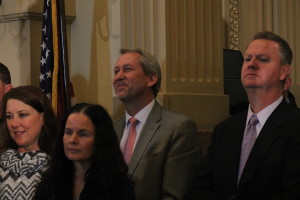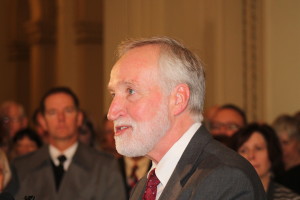January 12, 2016 12:20 PM· By Sherrie Peif

Brian Ewert, Littleton Public Schools, left back and Dan McMinimee, Jefferson County Public Schools right back listen to speakers advocate for increased education funding at the state capitol.
About a hundred teachers, school board members, union activists and others gathered Monday at the Colorado Capitol to support superintendents from across Colorado in their effort to increase funding for their school districts.
The exact number of superintendents on hand was not known, but organizers say superintendents from 167 of the 178 districts in Colorado support the efforts, which started with many lobbying legislators to support reclassifying the Hospital Provider Fee as an enterprise fund so it falls outside the requirements of the Colorado Taxpayer’s Bill of Rights (TABOR). The Independence Institute, a free-market think tank in Denver, says the Hospital Provider Fee is nothing more than a bed tax*.
The move would free up hundreds of millions of dollars under TABOR and leave the state free to fund other programs such as education. Superintendents say that since 2010 they have lost $5 billion in funding due to the “Negative Factor,” a budgeting mechanism used by the Colorado General Assembly to restrain total spending on public education while still allowing base spending to rise by enrollment plus inflation each year.
No mention was made at the conference of the Hospital Provider Fee, Colorado’s Legislative Legal Services recently issued a nonbinding legal opinion stating that exempting the so-called bed tax from TABOR as an “enterprise” would not be legal. The negative factor reduces funding to school finance factors not covered by Amendment 23, which include school district size, local cost-of-living, and the number of low-income kids in a district. The Colorado Supreme Court recently ruled that the negative factor is constitutional.
“Everyone was expected to tighten their belts,” said Shannon Bird, a parent of two Adams 12 students and a Westminster city councilwoman. “But now things are different. In Colorado, our economy as we know has been improving.”Bird said she has been told by state lawmakers that there is nothing that can be done to restore the cuts, an answer she was not happy with.
“An improved economy would mean that cuts would continue and at the same time, $10 and $15 refund checks would be sent out to our taxpayers,” she said. “Our legislators are smart people who are elected to solve tough problems. We are in dire need of a solution right now.”
She said the issue wasn’t partisan, but many don’t agree. On the left side of the spectrum, Democrats want roll back TABOR so that government can grow to meet what they see as rising funding needs. Republicans, on the other hand, believe that the answer lies in the state closely reevaluating where and how it spends its money, including in education.
Some in the audience Monday pointed to examples of wasted spending that included district buses used by several districts to transport teachers and administrators to the Capitol for the rally, or the $10,000 color flyer sent out by Littleton Public Schools Superintendent Brian Ewert to constituents asking them to lobby for the cause.

Boulder Valley School District Superintendent Bruce Messinger talks about the need for more money for education at the State Capitol.
Bruce Messinger, Boulder Valley School District Superintendent, said it was anticipated last May that there would be $72 million in additional revenue in the general fund thanks to an increase in assessed local property valuation and a resulting rise in local tax revenue.
Messinger’s district is one of the top-funded districts, thanks to generous voters who keep saying yes to mill levy overrides and bond issues. Most recently, the Greeley Tribune reported Boulder passed a $576 million bond in 2014, bringing its total to $1 billion in bonds in the past eight years. For the 2014-15 school year, Boulder had the highest per pupil funding among districts with more than 3,200 students at $9,122, about $1,500 -$2,500 more than many other districts.
“Turns out [the increased local property tax revenue] exceeds $150 million that is available this year,” Messinger said.
Along with another $24 million for enrollment projections, Messinger said there is about $175 million available.
“It is in this budget right now,” Messinger said, calling for the money to be supplemented to this year’s districts.
On the grand scale of things, when the overall budgets of schools districts are considered, $175 million doesn’t account for much. Jefferson County Public Schools alone has more than a $1 billion budget. $175 million is just under the entire Greeley-Evans School District 6 budget, the state’s 13 largest school district.
Messinger also called upon the legislature to eliminate the negative factor.
“What we’re asking for is that the hole not get any deeper,” Messinger said. “What we’re asking is that we maintain the present level of funding for schools. That we keep up with inflation and we keep up with enrollment growth because if we don’t, the Negative Factor will increase which only puts us further behind. You look out and you say we’ve got this thriving economy. And then to be sending out a tax refund as a result of present law is troubling to all of us who support the education of children.”
*The author of this article is employed by the Independence Institute.
http://completecolorado.com/pagetwo/2016/01/12/colorado-superintendents-ask-for-increased-funding/
Leave a Reply